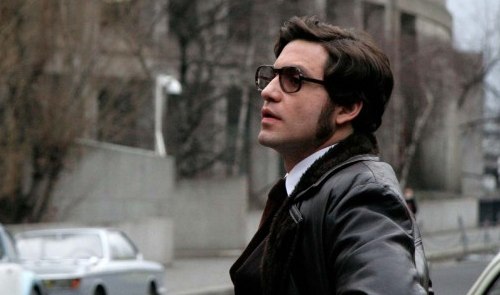REVIEW: Olivier Assayas' Carlos Paints a Brilliant Portrait of an International Celebuterrorist
 It's a tricky feat, channeling the glamour of a famous international terrorist without glamorizing him. But damned if French filmmaker Olivier Assayas doesn't pull it off with Carlos, his epic and highly entertaining portrait of Carlos the Jackal, the Venezuelan-born, pro-Palestinian, anti-Imperialist, Japanese Red Army-affiliated celebuterrorist of the '70s and '80s.
It's a tricky feat, channeling the glamour of a famous international terrorist without glamorizing him. But damned if French filmmaker Olivier Assayas doesn't pull it off with Carlos, his epic and highly entertaining portrait of Carlos the Jackal, the Venezuelan-born, pro-Palestinian, anti-Imperialist, Japanese Red Army-affiliated celebuterrorist of the '70s and '80s.
In its full-length version, Carlos stretches out to a languorous yet surprisingly taut five and a half hours, though it has also been cut down to an equally effective -- though not as detailed -- two-and-a-half-hour version. The full version, which I have affectionately dubbed Maxi-Carlos, recently aired on the Sundance Channel. (It opens theatrically in New York this Friday, Oct. 15, and in Los Angeles on Oct. 22.) Some theaters may opt instead for Mini-Carlos -- which is also being made available via video on demand -- and although I recommend the full-strength version if you have the choice, neither Assayas' storytelling capabilities nor his knack for sharp characterization are compromised in the takeout-container portion. And either way, you get to watch Édgar Ramírez -- as the man who was born Ilich Ramirez Sànchez before his gradual transformation into the gun-loving, ideology-spouting, girl-chasing revolutionary Carlos -- in one of the most enjoyable performances of the year.
Carlos isn't exactly a portrait of a fun guy. In the movie's terms -- and the picture opens with a disclaimer reminding us that this is a fiction based on real-life characters and events -- Carlos is a tangle of contradictions and semi-contradictions. At any point in the course of this story, which opens in 1973 and covers a period of roughly 20 years, Carlos might be any combination of the following: A ruthless killer, a chauvinistic user, an affectionate father, a master manipulator, a sex god, a cocksure strategist, and even an insecure chubster. In the early sections of the story, Carlos -- still going by his given name, Ilich -- is still just a baby superterrorist, not yet ready to roll without his training wheels. A pro-Palestinian militant, he starts out by attempting (and failing) to assassinate a pro-Israeli London business magnate; then he skips off to Paris, where the Popular Front for the Liberation of Palestine (PFLP) puts him in charge of this or that dangerous mission.
In the aftermath, he shoots three French domestic intelligence officers who have begun snooping around his why's and wherefore's. Then it's on to southern Yemen, where the head of the PFLP, Wadie Haddad (Ahmad Kaabour), gives him the terror assignment of a lifetime: That of crashing an OPEC conference in Vienna (with the help of other Palestinian militants and leftists from German Revolutionary Cells), where he's to take a selection of hostages and off the Saudi oil minister, an operation that entails much running, shouting, and waving and firing of guns. The raid makes Carlos famous, even though it doesn't turn out as planned.
But that's just business as usual in the life of an international terrorist, and from there, Carlos allies himself with any scoundrel or rapscallaion (including Saddam Hussein) who pays him even a cockeyed compliment, as long as the money is right. From Iraq to Syria, Carlos makes "friends" wherever he goes. He lands, for a time, in Budapest and East Berlin, where he avails himself of any benefits the Iron Curtain might offer him. (He also finds a German-terrorist wife, a sharp and calculating little flirt played, in a fine-grained performance, by Nora von Waldstätten.) Then it's on to Sudan, where, after the disappointing (for him) fall of the Berlin Wall, he meets his ultimate betrayal.
Pages: 1 2
